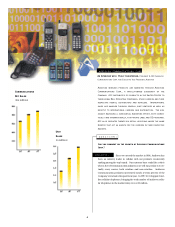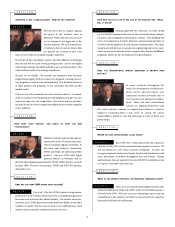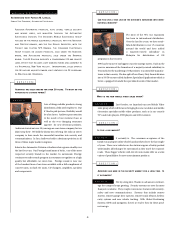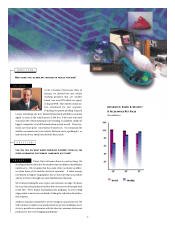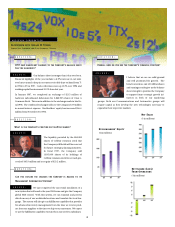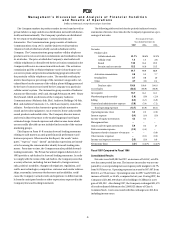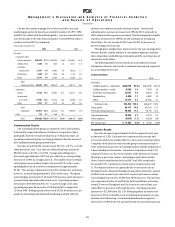Audiovox 1997 Annual Report Download - page 15
Download and view the complete annual report
Please find page 15 of the 1997 Audiovox annual report below. You can navigate through the pages in the report by either clicking on the pages listed below, or by using the keyword search tool below to find specific information within the annual report.
Impact of Inflation and Currency Fluctuation
Inflation has not had and is not expected to have a significant
impact on the Company’s financial position or operating results.
However, as the Company expands its operations into Latin America
and the Pacific Rim, the effects of inflation and currency fluctuations
in those areas, if any, could have growing significance to the financial
condition and results of the operations of the Company.
The Company has operations and conducts local business in Asia.
The recent fluctuations in the foreign exchange rates have not materi-
ally impacted the consolidated financial position, results of opera-
tions or liquidity. Management believes that continued fluctuations
will not have a material adverse effect on the Company’s consolidated
financial position, however the impact on the results of operations or
liquidity, particularly our Malaysian subsidiaries, is unknown.
While the prices that the Company pays for the products pur-
chased from its suppliers are principally denominated in United
States dollars, price negotiations depend in part on the relationship
between the foreign currency of the foreign manufacturers and the
United States dollar. This relationship is dependent upon, among
other things, market, trade and political factors.
Seasonality
The Company typically experiences some seasonality.The
Company believes such seasonality could be attributable to increased
demand for its products during the Christmas season, which com-
mences in October, for both wholesale and retail operations.
Year 2000 Date Conversion
Management believes that a significant portion of its computer
systems are year 2000 compliant and is in the process of assessing the
balance of its systems. The Company intends to communicate with
its customers, suppliers, financial institutions and others with which
it does business to ensure that any year 2000 issue will be resolved
timely. This issue affects computer systems that have time-sensitive
programs that may not properly recognize the year 2000. If neces-
sary modifications and conversions by those with which the
Company does business are not completed timely or if all of the
Company’s systems are not year 2000 compliant, the year 2000 issue
may have a material adverse effect on the Company’s consolidated
financial position, results of operations or liquidity.
Recent Accounting Pronouncements
The Financial Accounting Standards Board (FASB) has issued
Statement No. 128, “Earnings per Share” (Statement 128), on
December 1, 1997. Under Statement 128, the Company is required to
report basic and diluted earnings per share. It will replace the pre-
sentation of both primary and fully diluted earnings per share.
Statement 128 requires restatement of all prior-period earnings per
share data. The provisions of Statement 128 are effective for financial
statements issued for periods ending after December 15, 1997, includ-
ing interim periods, and earlier application is not permitted. The
provisions of Statement 128 must be implemented no later than fiscal
1998. The Company believes that Statement 128 will not have an
impact on the Company’s financial position, results of operations, or
liquidity, however, the impact on previously reported earnings per
share data is currently unknown.
In June 1997, the FASB issued Statement No. 130, “Reporting
Comprehensive Income”, effective for fiscal years beginning after
December 15, 1997. This Statement requires that all items that are
required to be recognized under accounting standards as compo-
nents of comprehensive income be reported in a financial statement
that is displayed with the same prominence as other financial state-
ments. This Statement further requires that an entity display an
amount representing total comprehensive income for the period in
that financial statement. This Statement also requires that an entity
classify items of other comprehensive income by their nature in a
financial statement. For example, other comprehensive income may
include foreign currency items and unrealized gains and losses on
investments in equity securities. Reclassification of financial state-
ments for earlier periods, provided for comparative purposes, is
required. Based on current accounting standards, this Statement is
not expected to have a material impact on the Company’s consolidat-
ed financial statements. The Company will adopt this accounting
standard effective December 1, 1999, as required.
In June 1997, the FASB issued Statement 131, “Disclosures about
Segments of an Enterprise and Related Information”, effective for fis-
cal years beginning after December 15, 1997. This Statement estab-
lishes standards for reporting information about operating segments
in annual financial statements and requires selected information
about operating segments in interim financial reports issued to
shareholders. It also establishes standards for related disclosures
about products and services, geographic areas and major customers.
Operating segments are defined as components of an enterprise
about which separate financial information is available that is evalu-
ated regularly by the chief operating decision maker in deciding how
to allocate resources and in assessing performance. This Statement
requires reporting segment profit or loss, certain specific revenue and
expense items and segment assets. It also requires reconciliations of
total segment revenues, total segment profit or loss, total segment
assets, and other amounts disclosed for segments to corresponding
amounts reported in the consolidated financial statements.
Restatement of comparative information for earlier periods presented
is required in the initial year of application. Interim information is
not required until the second year of application, at which time com-
parative information is required. The Company has not determined
the impact that the adoption of this new accounting standard will
have on its consolidated financial statements disclosures. The
Company will adopt this accounting standard effective December 1,
1999, as required.
M a n a g e m e n t ’ s D i s c u s s i o n a n d A n a l y s i s o f F i n a n c i a l C o n d i t i o n
a n d R e s u l t s o f O p e r a t i o n s
(continued)
14


